Mental Illness Awareness Week
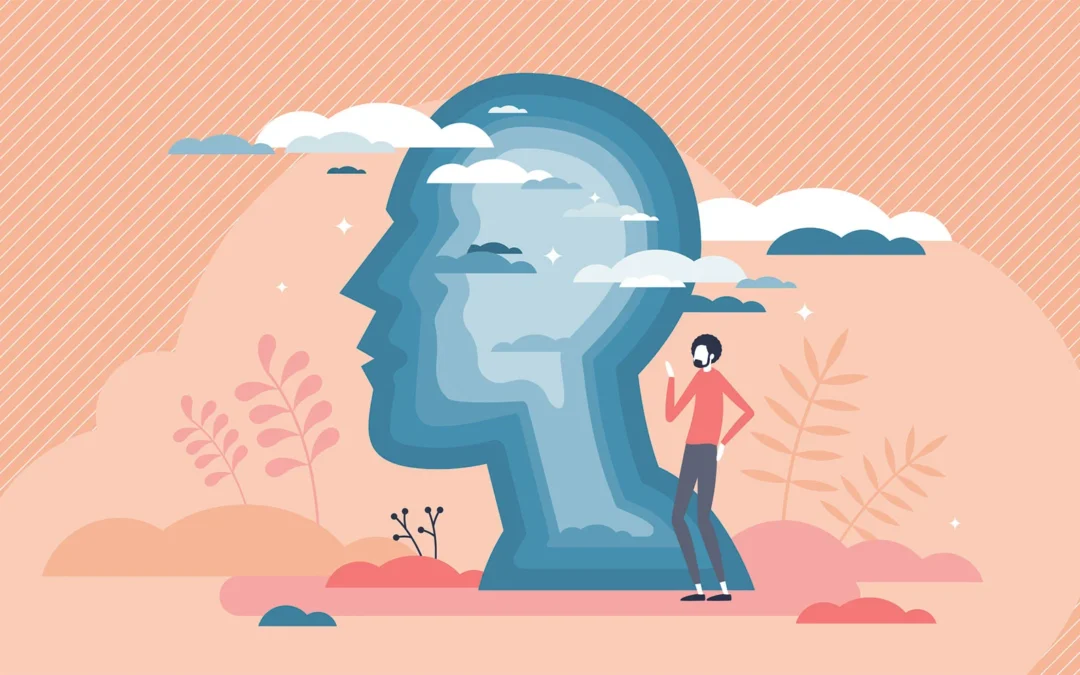
Every year, October hosts Mental Illness Awareness week, usually the first week in October and it culminates in mental Illness Awareness Day. This year 2025, Mental Illness Awareness week runs from October 5-11, 2025 with Mental Illness Awareness Day being Friday, October 10, 2025.
“A majority of Americans (70%) say they would prefer to be asked about both their physical and mental health during medical appointments with their primary care providers (PCPs). The finding from the new West Health-Gallup Survey on Mental Health in America comes as more than one in five U.S. adults, or 59.3 million people, were living with a mental illness in 2022.”
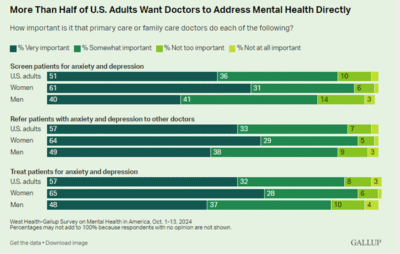
A significant barrier to accessing appropriate treatment is the stigma that exists around mental health and mental illness. Stigma is defined as a mark of disgrace associated with a particular circumstance, quality, or person. “Stigma reduction refers to the elimination of prejudice and discrimination against people with mental health and substance use disorders. When a disorder is stigmatized, people with that disorder are stigmatized. There is a misconception that these disorders only happen to people with “flawed character” or moral failure of some kind. In reality, these disorders can happen to anyone. Risk factors associated with these disorders – such as poverty, experiencing violence, or being from a marginalized group – are also heavily
stigmatized.” According to the CDC, 1 in 7 Americans report experiencing SUD (Substance Use Disorder) and 1 in 5 Americans experience a mental health disorder in a given year. Stigma causes people to feel ashamed for something that is out of their control. Worst of all, stigma prevents people from seeking the help they need. For a group of people who already carry such a heavy burden, stigma is an unacceptable addition to their pain. According to a recent report, over 50% of those with clinical level mental health risks do not seek help. In the U.S., 25% of those not seeking treatment report it is due to not wanting others to know.
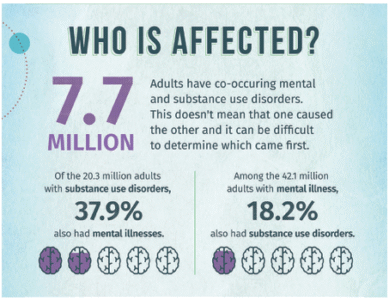
Did you know there are 3 types of stigma? Public, Systemic, and Self stigma exist which makes accessing care more difficult.
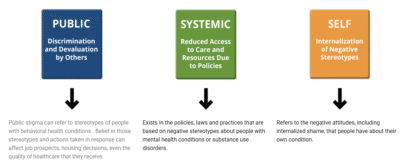
Stigma Examples:
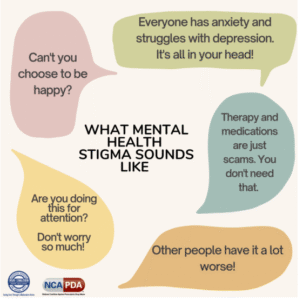
What can you do to help reduce stigma and increase access to care?
The National Alliance on Mental Illness (NAMI) offers some suggestions about what we can do as individuals to help reduce the stigma of mental illness:
- Talk openly about mental health. Share on social media and speak to friends.
- Educate yourself and others – respond to misperceptions or negative comments by sharing facts and experiences.
- Be conscious of language – remind people that words matter.
- Encourage equality between physical and mental illness – draw comparisons to how they would treat someone with cancer or diabetes.
- Show compassion for those with mental illness.
- Be honest about treatment – normalize mental health treatment, just like other health care treatment.
Simple techniques like how you speak to someone can immediately help to reduce the stigma around mental health and illness struggles. How do you speak to someone that you know struggles with mental health or mental illness? Below is a simple chart you can begin using immediately to help decrease stigma and begin normalizing discussions involving mental health and illness!
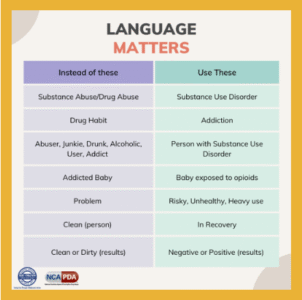
Mental health treatment works. If you or someone you know has a mental illness, is struggling emotionally, or has concerns about their mental health, there are many ways to get help:
- Call 911 if you or someone you know is in immediate danger or go to the nearest emergency room
- Call the National Suicide Prevention Lifeline by dialing 988
- Contact the Clinica Romero Behavioral Health dept. for an appointment today: 213-989-7700 ext. 2761or email: fsandoval@clinicaromero.com
- Contact NAMI of Greater Los Angeles here: https://namigla.org or call 213-386-3615.
- Crisis Text Line: Text “HOME” to 741741
- Veterans Crisis Line: Dial 988 and press 1 or text to 838255; Use Veterans Crisis Chat on the web
- Disaster Distress Help Line: Call or text 1-800-985-5990
Addressing these issues along with access to good mental health care can begin to decrease stigma, promote open dialogue with primary care providers can help support mental health and improve the quality of life for individuals living with mental illness.
References
https://westhealth.org/news/most-americans-want-primary-care-providers-to-address-mental-health/

